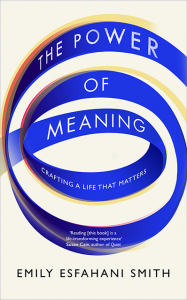It’s International Happiness day today but psychologist Emily Esfahani Smith says true contentment is not about happiness but something else entirely…
From nights out and feel-good films to watching cat videos on YouTube, it seems we’re all constantly searching for our next hit of happiness. But is being happy all it’s hyped up to be? In her new book, The Power of Meaning, writer and psychologist, Emily Esfahani Smith says yes and argues that leading a good life doesn’t just come from leading a happy one. Happiness can leave us feeling empty, she says. To live a life that leaves us feeling fulfilled, we should search for meaning instead.
MORE: The 6-step happy mind upgrade to do today
The search for the meaning of life has been poured over countless times. From Mother Teresa finding her purpose with the poor on the streets of Calcutta to Tupac rapping ‘Why am I dying to live, if I’m just living to die?’, it seems that all of us are looking for answers. But what exactly is wrong with hunting for happiness rather than meaning? And how can we find meaning in our own lives?
The happiness hype
Esfahani Smith traces how the happiness frenzy first began. In 1998 psychologist, Michael Seligman decided that rather than helping people to overcome their demons, he wanted to teach them how to live life well. He called upon his colleagues to investigate what exactly it is that makes life meaningful and they attempted to answer his call. But as Esfahani Smith describes, ‘many of them zeroed in on a topic that was both obvious and seemed easy to measure: happiness’.
in 2000 there were only fifty books published on the topic of happiness but by 2008 that had rocketed up to 4,000
This shift in psychology over the past twenty years has been hugely popular with the public. Because who doesn’t want to learn how to live a happier life? From here on in, the happiness hype was born and boomed as its own industry. According to Psychology Today, in 2000 there were only fifty books published on the topic of happiness but by 2008 that had rocketed up to 4,000. Esfahani Smith describes how the industry was jam-packed with ‘a deluge of celebrities, personal coaches and motivational speakers, all eager to share the gospel of happiness’.
So what’s the problem with chasing happiness?
Because happiness doesn’t lead to fulfilment, she explains. In The Power of Meaning, Esfahani Smith describes the difference between finding happiness and finding meaning.
In the long term, pursuing meaning can boost psychological health and lead to a better life.
Research taken at the Universities of Ottawa and Rochester instructed students to pursue either happiness or meaning over a ten-day period through at least one act each day. Some of the most popular actions by those pursuing meaning included forgiving a friend, studying and cheering up another person. Those that pursued happiness listed activities like sleeping in, playing games, going shopping and eating sweets.
Immediately after the experiment, the students chasing happiness experienced more positive feelings. However, this later turned on its head. ‘three months later the mood boost had faded… the students who pursued meaning felt more ‘enriched’, ‘inspired’ and ‘part of something greater than myself’… they also reported fewer negative moods,’ writes Esfahani Smith. She argues that this proves that in the long-term pursuing meaning can boost psychological health and lead to a better life.
How can I find meaning in my life?
Esfahani Smith has identified four pillars on which meaning rests and suggests ways to find yours.
Belonging
‘We all need to feel understood, recognized, and affirmed by our friends, family members, and romantic partners. We all need to give and recieve affection. We all need to find our tribe,’ writes Esfahani Smith. Psychologists explain that when other people believe that you matter then you also believe you matter.
‘The way we satisfy our need to belong changes over the course of our lives,’ writes the psychologist ‘In our early years, the love of a caregiver is essential; as we grow older, we find belonging in our relationships with friends, family members, and romantic partners.’
psychologists have discovered the value of small moments of intimacy between two people
So by spending more time with our loved ones we are already adding meaning to our lives. But connecting with other people can be tough, especially in the digital age. ‘In our age of isolation,’ says Esfahani Smith, ‘it’s more critical than ever to actively seek out social groups and work hard to build close relationships’.
So how can we connect with other people? Finding common ground with others might be a good start, ‘people are more likely to befriend those with whom they share common experiences and values.’ It’s also important for us to take the time to see the value in others and accept them when they reach out to us. Taking the time out to listen to other people can be crucial to relationship building.
And it’s not just close relationships that can be used to forge meaning in our lives. Esfahani Smith describes how psychologists have discovered the value of small moments of intimacy between two people, ‘like when a couple holds hands on a walk, or when two strangers have an empathetic conversation on a plane.’ The below TED talk by Kio Stark talks about why you should speak to strangers.
Esfahani Smith argues that having these intimate connections and having close relationships requires us to focus on others. And putting the needs of others before our own can help us in our own lives. As the guru of all things meaning puts it, ‘Compassion lies at the center of the pillar of belonging.’
We can decide whether to respond kindly, rather than antagonistically, to an annoying colleague
‘We can’t control whether someone will make a high-quality connection with us, but we can all choose to initiate or reciprocate one. We can decide whether to respond kindly, rather than antagonistically, to an annoying colleague. We can say hello to a stranger on the street rather than avert our eyes… we can invite people to belong,’ she advises.
Purpose
Esfahani Smith explains that although living a life of purpose sounds like a big task, it really doesn’t have to be. We can take small steps in our own lives to achieve purpose and feel more fulfilled. Leading a purposeful life doesn’t have to mean ending world hunger, it could be as simple as creating a more cheerful working environment in your office, ‘you can also find purpose in being a good parent to your children,’ she writes.
According to the psychologist, having purpose partly comes down to having a ‘stable, long-reaching goal’. ‘It is the forward-pointing arrow that motivates our behaviour and serves as the organizing principle in our lives.’
She adds that finding a sense of purpose makes people more resilient and motivated and ‘they have the drive to muddle through the good and bad of life in order to accomplish their goals.’ Esfahani Smith says that to live with purpose we require both self-reflection and self-knowledge.
To live with purpose we should live life asking ourselves questions such as: What kind of person am I and what kind of person do I want to be? And to revisit these questions at every stage of our life.
channel your skills into the work you’re already doing
Esfahani Smith advises being aware of your strengths and using them to reach your purpose and potential. ‘Research shows that when people use their strengths at work, they find more meaning in their jobs and ultimately perform better.’ If you’re full of energy and enthusiasm, you might make a great educator but you don’t have to change career. The psychologist recommends that you channel your skills into the work you’re already doing. For example, if you’re a lawyer, channel it into helping your clients. She adds that when we pursue goals that align with our core values and interests then we tend to feel more satisfied and competent and this, in turn, leads to a greater level of both purpose and meaning in our lives.
Storytelling
Because of a deep-seated human need to share, Esfahani Smith explains that we’re all storytellers. And by telling our story to others we are able to better understand ourselves. ‘By taking the disparate pieces of our lives and placing them together into a narrative, we create a unified whole that allows us to understand our lives as coherent,’ she writes. She also explains that psychologists believe that understanding and making sense of our lives is a key source of meaning.
Esfahani Smith describes how stories can be crucial to defining our identity and when we reinvent our story we can change our lives for the better. Our story isn’t a list of the things that have happened to us but we make ‘narrative choices’ when we tell them. So narrate the life that you want to lead.
Stories allow us to give ourselves a positive identity. ‘One of the great contributions of psychology and psychotherapy research is the idea that we can edit, revise and interpret the stories we tell about our lives,’ writes Emily Esfahani Smith. If you are struggling with mental health issues, you can work with a psychotherapist to rewrite your story in a more positive way.
If we create positive future versions of ourselves this can help to drive us.
Reflecting on the pivotal moments in our lives is another way that we can develop meaning through storytelling. We can look at the key moments in our lives and see how they helped to shape who we are. A way that we can do this is to think counterfactually. This basically means looking at our life and asking: what if I did things differently? Esfahani Smith writes that this exercise can add meaning to our lives, ‘it helps us appreciate the benefits of the path that we ultimately took.’
Esfahani Smith explains this with examples, ‘If I hadn’t met Julie at that party… I never would have been introduced to the woman I eventually married.’
It’s also important to look forward with our storytelling. If we create positive future versions of ourselves this can help to drive us. ‘Visions of the future give hope because they are in reach,’ she says.
So not only share your story with others, create a story for your future self.
Transendence
Have you ever experienced the feeling of looking up into the night’s sky, littered with glowing stars and felt incredibly small and insignificant? According to Esfahani Smith, moments like this can fill us with a deep and powerful sense of meaning.
‘A brush with mystery – whether underneath the stars, before a gorgeous work of art, during a religious ritual, or in the hospital delivery room – can transform us’, the psychologist says that the feelings we get in these situations are indications of the power of transcendence.
The word ‘transcend’ simply means ‘to go beyond’. And we experience transcendence when we rise above the experiences of every day. Often these experiences are religious, but they don’t have to be. When we experience transcendence we ‘feel deeply connected to other people and everything else that exists in the world.’ The result? ‘Our anxieties about existence and death evaporate, and life finally seems, for a moment, to make sense – which leaves us with a sense of peace and wellbeing.’
an experience of transcendence is so transformative – it changes and challenges the way we make sense of the world.
This emotional response that we have to a mystery is also known as awe. And feeling awe can go a long way to helping us to find meaning in our lives. Awe happens when we see something that is so vast we simply can’t comprehend it. Because we’ve never experienced anything like this before in our lives, our brains have to adapt quickly to process it and this is why an experience of transcendence is so transformative – it changes and challenges the way we make sense of the world.
During a transcendent experience, we feel a sense of ‘self-loss’ as we realise that there are things more important than ourselves. It’s also known as ‘ego-loss’ and can even help to prepare us for death.
Of course, we can’t make ourselves feel in awe. But being open to the experience, meditative practice and even hallucinogenics (although we wouldn’t recommend it) can all induce feelings of transcendence. Mindfulness meditation, in particular, creates a sense of heightened awareness and can help you to step away from your thoughts and feelings and experience everything, even your sensations, neutrally.


The Power of Meaning: Crafting a life that matters (Penguin Randomhouse), £13.48 is available to buy here.
Read more
10 tips for being mindful every day that will change your life
3 self help rules you need to break
8 inspirational books to make you happier
Like this article? Sign up to our newsletter to get more articles like this delivered straight to your inbox.

























































